Discover the value of Pasture-Raised Chickens for nutrition and sustainability.
Factual data: Pasture-raised chickens offer several benefits for both the consumer and the environment. Raising chickens on pasture allows them to supplement their diet with nutrient-dense food from grazing, resulting in healthier birds and land. The practice of raising chickens on pasture is sustainable and regenerative, revitalizing the land. Pasture-raised chicken is more nutritious, with higher levels of omega-3s, vitamins A, D, and E, and lower saturated fats compared to factory-farmed chicken. Chickens raised on pasture are treated humanely with access to fresh air, sunlight, and ample grazing area. Additionally, pasture-raised poultry is better for the environment, as their manure helps rejuvenate the land. Farmers who raise animals on pasture prioritize sustainability and conservation. Overall, choosing pasture-raised chicken supports a healthier diet, happier chickens, and responsible and regenerative agricultural practices.
Key Takeaways:
- Pasture-raised chickens offer numerous benefits for both consumers and the environment.
- These chickens have access to nutrient-dense food from grazing, resulting in healthier birds and land.
- Compared to factory-farmed chicken, pasture-raised chicken is more nutritious, with higher levels of omega-3s, vitamins A, D, and E, and lower saturated fats.
- Raising chickens on pasture allows for humane treatment, with chickens having access to fresh air, sunlight, and ample grazing areas.
- Pasture-raised chicken is better for the environment, as their manure helps revitalize the land and support regenerative agriculture.
What is Pasture-Raised Chicken?
Pasture-raised chicken refers to chickens that are raised on outdoor pastures rather than confined in factory farms. This farming practice allows chickens to roam freely and graze on a variety of plants, insects, and worms, resulting in a more natural and nutrient-rich diet. Unlike chickens raised in confinement, pasture-raised chickens have ample space to move around, spread their wings, and exhibit natural behaviors.
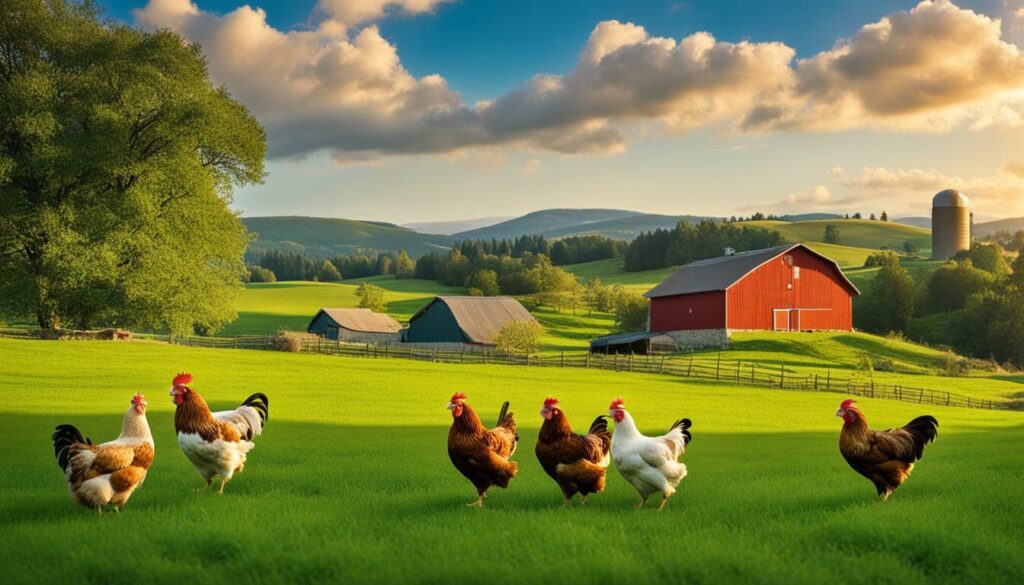
The organic and sustainable nature of pasture-raised chicken farming ensures that the birds are not treated with antibiotics or growth hormones, making it a healthier choice for consumers. Additionally, pasture-raised chickens are not fed with genetically modified organisms (GMOs) or artificial additives, ensuring a more natural and wholesome product.
By allowing chickens to forage on pasture, farmers are able to provide a stress-free environment for the birds, promoting their overall welfare and happiness. The chickens have access to fresh air, natural sunlight, and a diverse diet, which contributes to their overall well-being. This humane treatment is a key aspect of pasture-raised chicken farming.
Simulating Nature’s Harmony
The practice of raising chickens on pasture closely mimics their natural habitat and behavior. Chickens are naturally inclined to peck and scratch the ground, searching for insects, seeds, and greens. Pasture-raised chicken farming allows them to express their natural instincts and exhibit a more natural behavior, resulting in healthier and happier birds.
By choosing pasture-raised chicken, consumers not only enjoy a more nutritious and flavorful product but also support responsible and ethical farming practices. The regenerative nature of pasture-raised chicken farming helps revitalize the land, preserving biodiversity and promoting long-term sustainability. It is a choice that benefits both our health and the environment.
| Benefits of Pasture-Raised Chicken |
|---|
| Higher levels of omega-3s |
| Rich in vitamins A, D, and E |
| Lower saturated fats |
| Humane treatment of chickens |
| Environmental sustainability |
| Regenerative agriculture |
| Supports healthier diets |
| Responsible and ethical farming practices |
As consumers, we have the power to make a positive impact on our health and the environment through the choices we make. By opting for pasture-raised chicken, we are not only nourishing ourselves with better nutrition but also supporting a more sustainable and humane food system.
The Nutritional Benefits of Pasture-Raised Chicken
Pasture-raised chicken offers superior nutritional benefits compared to factory-farmed chicken. The practice of raising chickens on pasture allows them to graze on nutrient-dense food, resulting in healthier birds and more nutritious eggs and meat. These chickens have a diet that includes grass, insects, and other forage, which provides them with a diverse range of vitamins and minerals.
One noteworthy advantage of pasture-raised chicken is its higher levels of omega-3 fatty acids. Omega-3s are essential for good health, promoting heart health, reducing inflammation, and supporting brain function. Studies have shown that pasture-raised chicken has significantly higher levels of omega-3s compared to conventionally raised chicken.
Pasture-raised chicken is also an excellent source of vitamins A, D, and E. These vitamins are crucial for maintaining healthy vision, bones, and immune function. Compared to factory-farmed chicken, pasture-raised chicken contains higher levels of these essential vitamins, making it a more nutrient-rich choice.
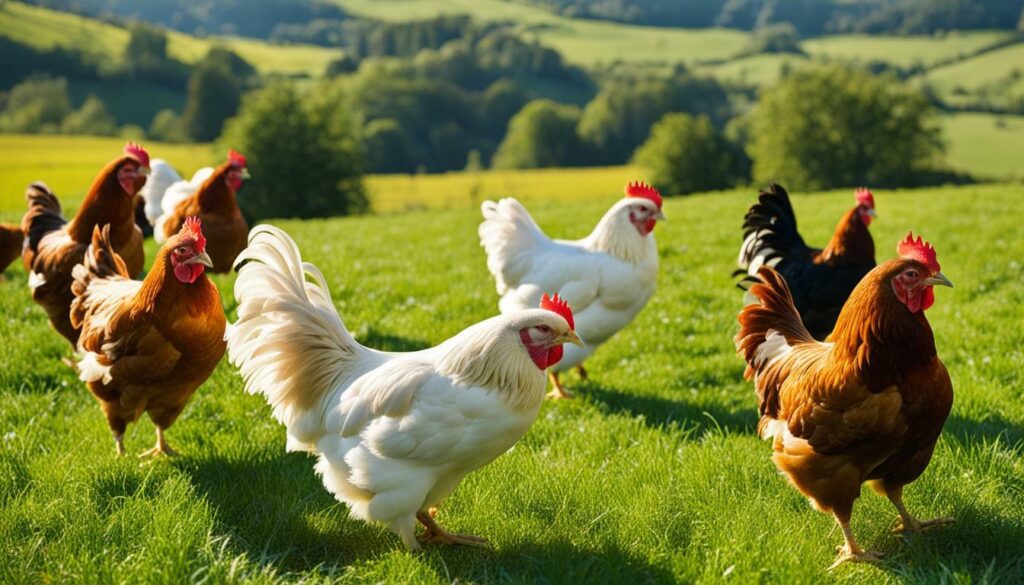
“Pasture-raised chicken offers superior nutritional benefits compared to factory-farmed chicken.”
In addition to omega-3s and vitamins, pasture-raised chicken is lower in saturated fats. This makes it a healthier option for individuals looking to reduce their saturated fat intake. By choosing pasture-raised chicken, consumers can enjoy delicious and nutrient-packed meals while prioritizing their health.
Supporting responsible and ethical farming practices is another key reason to choose pasture-raised chicken. These chickens are raised humanely, allowed to roam freely and engage in natural behaviors. They have access to fresh air, sunlight, and ample grazing areas, which contribute to their overall well-being.
In conclusion, pasture-raised chicken not only offers superior nutritional benefits but also supports ethical farming practices and helps protect the environment. By making the choice to consume pasture-raised chicken, individuals can contribute to their own health and the sustainable future of our food system.
Animal Welfare and Humane Treatment
Chickens raised on pasture are treated with compassion and provided with a healthy environment to thrive. Unlike conventional factory-farmed chickens, which are often confined to small cages or overcrowded barns, pasture-raised chickens have the freedom to roam and engage in natural behaviors.
When chickens are raised on pasture, they have access to fresh air, sunlight, and ample grazing areas. This allows them to forage for insects, seeds, and grass, which supplement their diet with nutrient-dense food. By giving chickens the opportunity to graze and exercise, they develop stronger muscles and healthier immune systems.
Aside from the physical benefits, pasture-raised chickens also experience reduced stress levels. They are less prone to aggression and disease while exhibiting natural behaviors, such as dust bathing and socializing with other birds. These factors contribute to the overall well-being and happiness of the chickens.
Research has shown that pasture-raised chickens produce eggs and meat with superior taste and texture. The higher nutrient content and natural diet of pasture-raised chickens result in a richer flavor and more satisfying eating experience for consumers. By choosing pasture-raised chicken, consumers can support ethical farming practices and enjoy high-quality poultry products.
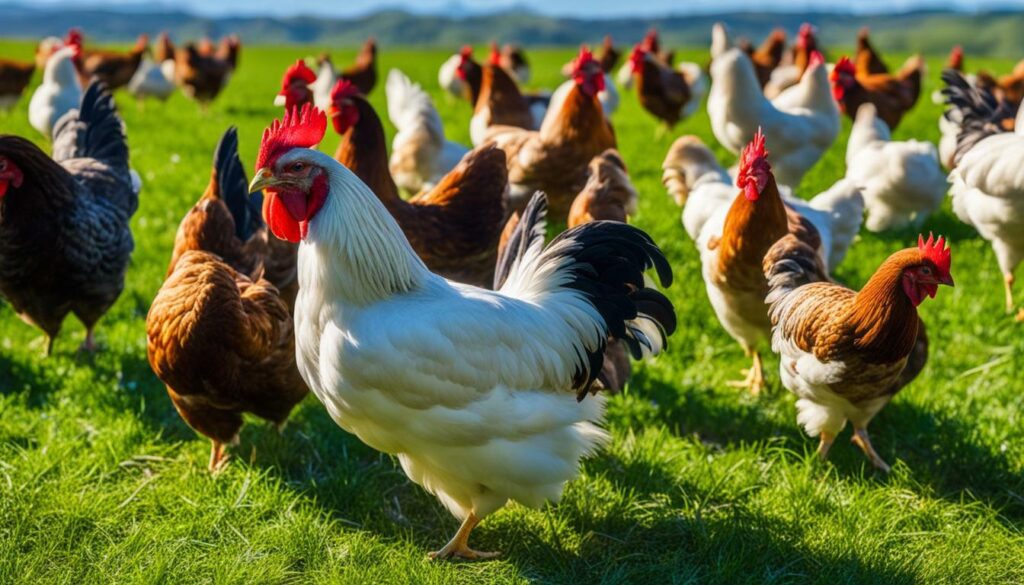
Table: Nutritional Comparison of Pasture-Raised Chicken and Factory-Farmed Chicken
| Nutrient | Pasture-Raised Chicken | Factory-Farmed Chicken |
|---|---|---|
| Omega-3 Fatty Acids | High | Low |
| Vitamin A | Higher levels | Lower levels |
| Vitamin D | Higher levels | Lower levels |
| Vitamin E | Higher levels | Lower levels |
| Saturated Fats | Lower levels | Higher levels |
By prioritizing the well-being of chickens and the environment, pasture-raised chicken provides a more sustainable and ethical choice for consumers. Supporting farmers who employ responsible and humane farming practices not only ensures the welfare of animals but also contributes to the preservation of our ecosystems. So, the next time you buy chicken, consider choosing pasture-raised for a healthier, happier, and more sustainable option.
Environmental Sustainability of Pasture-Raised Chicken
Pasture-raised chicken farming contributes to environmental sustainability and conservation efforts. By allowing chickens to roam freely on pasture, farmers minimize the environmental impact of their operations. The chickens graze on grass and forage, reducing the need for intensive grain feeding, which requires large amounts of water, land, and fossil fuels to produce. This practice helps mitigate deforestation and reduces greenhouse gas emissions.
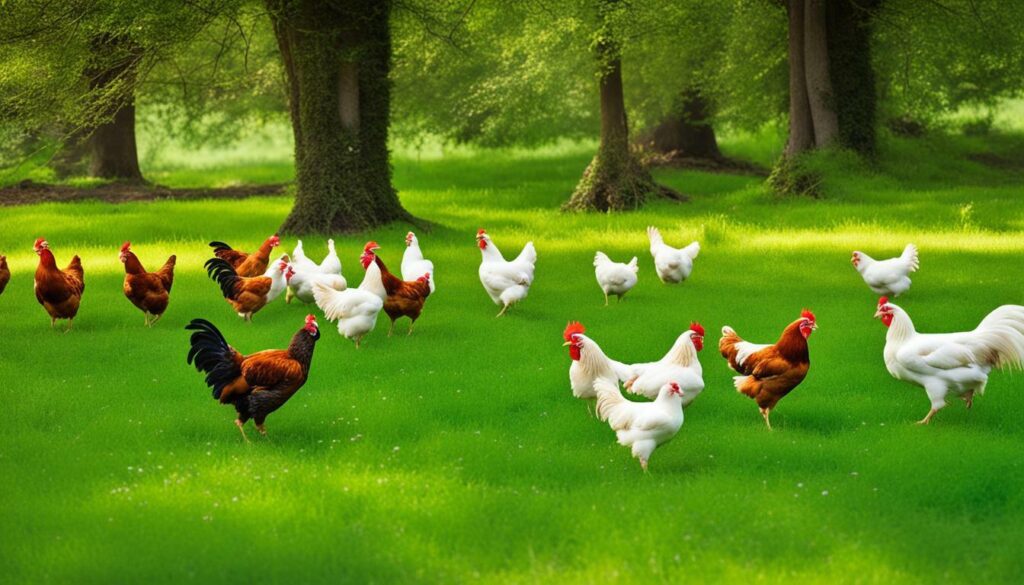
Moreover, pasture-raised chicken farming promotes regenerative agriculture. As chickens peck and scratch the soil, they naturally till and fertilize it with their manure. This helps improve soil health by increasing microbial activity and nutrient availability. The chickens’ constant movement also prevents soil compaction, allowing rainwater to penetrate the ground more effectively and preventing erosion.
Furthermore, pasture-raised chicken farming aligns with organic and free-range principles. Farmers who raise chickens on pasture typically use organic farming practices, avoiding synthetic fertilizers, pesticides, and antibiotics. This approach creates a healthier ecosystem by preserving biodiversity, protecting water quality, and reducing chemical pollution.
In summary, pasture-raised chicken farming offers an environmentally sustainable alternative to conventional poultry production. It reduces the carbon footprint, conserves natural resources, revitalizes the land, and promotes organic and free-range principles. By choosing pasture-raised chicken, consumers can support a healthier environment and contribute to a more sustainable food system.
Regenerative Agriculture and Land Revitalization
Pasture-raised chicken farming plays a crucial role in sustainable and regenerative agricultural practices. By allowing chickens to roam freely on pasture, farmers promote a natural cycle of land revitalization. Chickens graze on vegetation, insects, and other natural food sources, stimulating the growth of native plants and helping to control weed populations. Their scratching and pecking behavior promotes soil aeration and nutrient distribution, enhancing soil health. This regenerative approach to farming not only benefits the land but also contributes to the overall sustainability of the agricultural system.
In addition to revitalizing the land, pasture-raised chicken farming helps mitigate environmental challenges. As chickens roam on pasture, their manure acts as a valuable fertilizer, replenishing the soil with essential nutrients. This reduces the need for synthetic fertilizers and minimizes nutrient runoff, which can lead to water pollution. By avoiding concentrated animal feeding operations (CAFOs) and instead adopting a pasture-based approach, farmers contribute to the preservation of natural resources and the long-term health of ecosystems.
One example of how pasture-raised chicken farming supports regenerative agriculture is through rotational grazing. This practice involves moving chickens to fresh pasture regularly, allowing the land to recover and regenerate. Rotational grazing prevents overgrazing and enables the restoration of native plant species, improving biodiversity and overall ecosystem health. Research has shown that rotational grazing systems can effectively sequester carbon and help combat climate change, making pasture-raised chicken farming an important ally in the fight against global environmental issues.
By choosing pasture-raised chicken, consumers not only enjoy the benefits of superior nutrition and humane treatment but also support a farming practice that prioritizes sustainability and land revitalization. As awareness of the environmental impact of food production grows, pasture-raised chicken farming emerges as a responsible and regenerative alternative. It offers a sustainable solution that nourishes both people and the planet, promoting a healthier future for all.

Note: The image above represents the regenerative agriculture and land revitalization achieved through pasture-raised chicken farming.
Supporting Healthier Diets with Pasture-Raised Chicken
Incorporating pasture-raised chicken into your diet can have positive impacts on overall health and nutrition. Not only does pasture-raised chicken provide a lean source of protein, but it also offers unique nutritional benefits that set it apart from conventional factory-farmed chicken.
Compared to their factory-farmed counterparts, pasture-raised chickens have higher levels of omega-3 fatty acids, which are essential for heart health and brain function. These beneficial fats are obtained through the chickens’ varied diet, which includes grasses, insects, and seeds found in the pasture. Additionally, pasture-raised chicken contains higher levels of vitamins A, D, and E, which are crucial for immune function, bone health, and overall well-being.
The superior nutrition of pasture-raised chicken can be attributed to the natural and holistic farming practices employed by responsible farmers. By allowing chickens to roam freely in open pastures, they have the opportunity to engage in natural behaviors, such as foraging and grazing, which results in healthier birds and more nutrient-dense meat and eggs. The well-being of the chickens is reflected in the quality of the food they produce.
Choosing pasture-raised chicken not only benefits your personal health but also contributes to a more sustainable and environmentally friendly food system. Pasture-raised chickens graze on open fields, which promotes regenerative agriculture and revitalizes the land. Their natural foraging behavior helps control pests and weeds, reducing the need for chemical pesticides. Moreover, their manure serves as a valuable fertilizer, enriching the soil and promoting soil health.
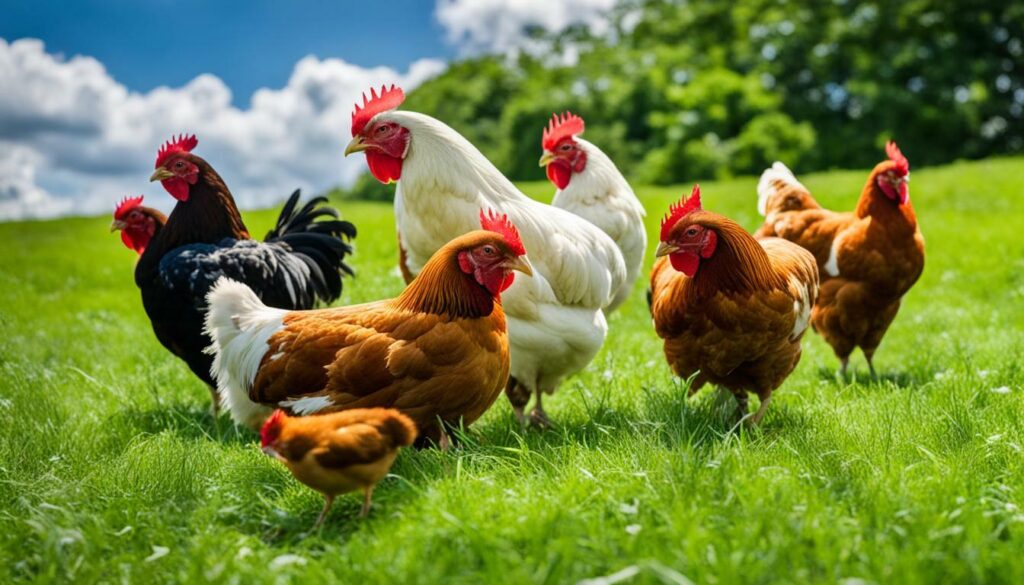
By supporting farmers who prioritize responsible and ethical farming practices, you play a vital role in promoting a healthier and more sustainable food system. Choose pasture-raised chicken for its superior nutrition, humane treatment of animals, and positive impact on the environment. Incorporate pasture-raised chicken into your diet and experience the benefits it brings to your health, the welfare of animals, and the regeneration of our land.
Responsible and Ethical Farming Practices
By choosing pasture-raised chicken, you are supporting responsible and ethical farming practices. Pasture-raised chickens are raised in a humane environment, where they have access to fresh air, sunlight, and ample grazing areas. This allows them to exhibit their natural behaviors and leads to happier and healthier chickens. Farmers who raise animals on pasture prioritize sustainability and conservation, ensuring that the land is well-maintained and revitalized.
Unlike factory-farmed chickens, pasture-raised chickens are not confined to cramped cages or overcrowded barns. They are allowed to roam freely, foraging for insects and plants in the pasture. This natural diet supplemented with grazing results in more nutritious meat and eggs. Pasture-raised chicken has higher levels of beneficial omega-3 fatty acids, vitamins A, D, and E, and lower levels of saturated fats compared to conventionally raised chicken.
“Pasture-raised chickens are raised in a humane environment, where they have access to fresh air, sunlight, and ample grazing areas.”
Moreover, pasture-raised chickens contribute to the sustainability of our environment. Their natural foraging habits help control pests and reduce the need for chemical pesticides. The chickens’ manure acts as a natural fertilizer, enriching the soil and promoting regenerative agriculture. This practice not only benefits the chickens but also supports the health of our ecosystems and ultimately, our own well-being.
By supporting responsible and ethical farming practices through the choice of pasture-raised chicken, you are making a positive impact. You are not only nourishing your body with healthier, more nutritious food, but also promoting the welfare of animals and the conservation of our planet. Together, we can create a more sustainable and regenerative future.
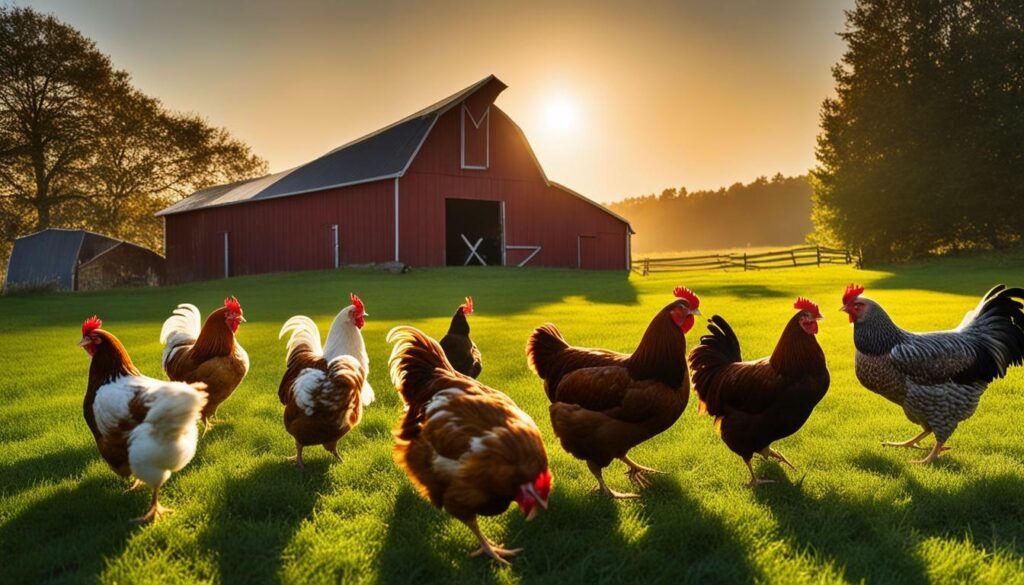
| Benefits of Pasture-Raised Chicken: | Benefits of Pasture-Raised Chicken: |
|---|---|
| Nutritious meat and eggs | Supports sustainable and regenerative farming |
| Higher levels of omega-3s, vitamins A, D, and E | Reduces the need for chemical pesticides |
| Lower saturated fats | Contributes to soil rejuvenation and fertility |
| Humane treatment and natural living conditions | Promotes the well-being of animals and ecosystems |
Conclusion
In conclusion, pasture-raised chicken offers a multitude of benefits for consumers, chickens, and the planet. By raising chickens on pasture, they have the opportunity to graze on nutrient-dense food, resulting in healthier birds and land. The practice of raising chickens on pasture is not only sustainable but also regenerative, rejuvenating the land and promoting ecological balance.
One of the significant advantages of pasture-raised chicken is its superior nutritional profile. Compared to factory-farmed chicken, pasture-raised chicken contains higher levels of omega-3 fatty acids, which are essential for heart health. It also boasts increased amounts of vitamins A, D, and E, vital for immune function and overall well-being. Additionally, pasture-raised chicken has lower saturated fats, making it a healthier choice for those conscious of their dietary intake.
Animal welfare is another crucial aspect of pasture-raised chicken. These chickens are treated with care, having access to fresh air, ample grazing areas, and natural sunlight. Such humane treatment ensures that the chickens live a happier and healthier life, free from confinement and stress. By supporting pasture-raised chicken, consumers are actively promoting ethical farming practices and the wellbeing of animals.
Furthermore, choosing pasture-raised chicken contributes to environmental sustainability. The chickens’ natural foraging habits and free-range grazing alleviate pressure on agricultural land and minimize the need for synthetic fertilizers and pesticides. The chickens’ manure, rich in nutrients, acts as a natural fertilizer, revitalizing the soil and promoting biodiversity. Farmers who raise animals on pasture prioritize sustainable and regenerative practices, fostering a healthier ecosystem for all.
In summary, pasture-raised chicken offers numerous benefits, including superior nutrition, humane treatment of animals, and environmental sustainability. By opting for pasture-raised chicken, consumers can support a healthier diet, happier birds, and responsible agricultural practices. It is a choice that not only nourishes our bodies but also contributes to a greener and more sustainable future.
FAQ
Q: What is pasture-raised chicken?
A: Pasture-raised chicken refers to chickens that are raised on open pasture, allowing them to roam freely and graze on nutrient-dense food. This farming practice is different from conventional methods where chickens are raised in confinement.
Q: What are the benefits of pasture-raised chicken?
A: Pasture-raised chicken offers several benefits. It is more nutritious, with higher levels of omega-3s, vitamins A, D, and E, and lower saturated fats compared to factory-farmed chicken. The chickens are treated humanely, with access to fresh air, sunlight, and ample grazing area. Additionally, raising chickens on pasture is sustainable and regenerative, revitalizing the land and supporting responsible farming practices.
Q: How does pasture-raised chicken benefit the environment?
A: Raising chickens on pasture positively impacts the environment. The chickens help rejuvenate the land through their manure, which provides natural fertilization. The farming practices associated with pasture-raised chicken, such as free-range grazing and organic methods, also contribute to environmental sustainability.
Q: Is pasture-raised chicken healthier than factory-farmed chicken?
A: Yes, pasture-raised chicken is considered healthier. It contains higher levels of beneficial nutrients like omega-3s and vitamins, and lower levels of saturated fats compared to factory-farmed chicken. The chickens are also not exposed to hormones or antibiotics commonly used in industrial farming.
Q: How does pasture-raised chicken support a healthier diet?
A: Choosing pasture-raised chicken supports a healthier diet by providing superior nutrition. The higher levels of omega-3s, vitamins, and lower saturated fats in pasture-raised chicken contribute to overall better health. It is a more wholesome option compared to factory-farmed chicken.
Q: Are pasture-raised chickens treated humanely?
A: Yes, pasture-raised chickens are treated humanely. They have access to fresh air, sunlight, and ample grazing area, allowing them to exhibit natural behaviors. The focus on animal welfare ensures that the chickens are raised in a stress-free environment.
Q: Can pasture-raised chicken be considered sustainable?
A: Yes, raising chickens on pasture is a sustainable practice. It promotes regenerative agriculture by revitalizing the land and reducing the environmental impact of conventional farming methods. Farmers who raise animals on pasture prioritize sustainability and conservation.
Q: How does pasture-raised chicken contribute to regenerative agriculture?
A: Pasture-raised chicken contributes to regenerative agriculture by revitalizing the land. The chickens help improve soil health through their natural fertilization, which leads to increased biodiversity and healthier ecosystems. This farming practice ensures the long-term viability of the land and promotes a sustainable food system.
Q: Why is supporting responsible and ethical farming practices important?
A: Supporting farmers who prioritize responsible and ethical farming practices, such as pasture-raised chicken production, is essential for a sustainable food system. It ensures the well-being of animals, the preservation of natural resources, and the health of consumers. By choosing pasture-raised chicken, you are making a conscious choice to support farmers who prioritize both the environment and animal welfare.






